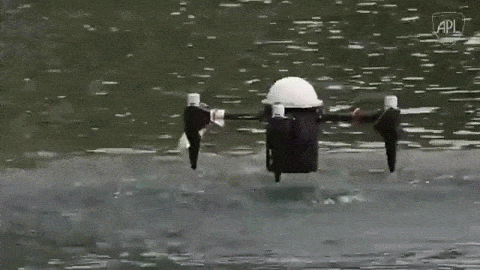Johns Hopkins’ Applied Physics Lab (APL) made its mark on space with the last year’s epic Pluto pics. This year, though, the Laurel-based lab is making drone headlines.
Scientists are developing a drone that’s capable of taking to the land and air. It can hide for underwater for months. It’s 3D printed. It’s called the Corrosion Resistant Aerial Covert Unmanned Nautical System.
Sounds like a boring name for such a cool device? Nah, the acronym is CRACUNS.
The APL team brought its expertise working on submarines and drones to the project. To test it, the scientists left the motors in saltwater for two months, and they showed no signs of corrosion thanks to some protective coating.
CRACUNS can also take off from a fixed point when fully submerged. That makes it more likely to escape any situation a UAV is likely to encounter — like, say, a crabber’s net.







